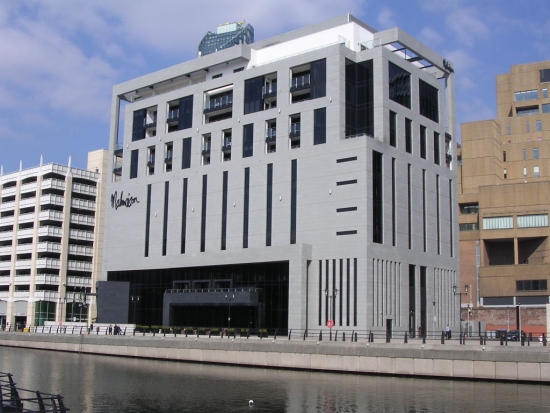The company behind Hotel du Vin and Malmaison is poised to assign administrators within days as it fights to refinance or find a buyer.
However the management of MWB Group has vowed that the problems affecting the parent company would have “no impact” on the trading of Hotel du Vin and Malmaison, and that both businesses were “continuing to trade in line with expectations”.
It is understood MWB will appoint its advisor Deloitte as administrator after talks to find a new investor for the 26 hotels reached deadlock.

Malmaison Hotel, Princess Dock Liverpool
The group is facing a cash crisis after it emerged it was in disagreement with its 75 per cent owned subsidiary, temporary office space company MWB Business Exchange. Two weeks ago the division declared it would hold back monthly payments to the group on a £4.8 million loan, claiming it would counterbalance the liability against an £8m loan the hotels group in turn owed to the business centre division.
The move lead to the group suspending its shares on the London Stock Exchange at the beginning of the month and postponing the publication of its yearly results, as it warned the dispute could result in the shares becoming valueless.
Last Tuesday (13November) the hotel group announced its finance director, Keval Pankhania, and another director would leave the company instantly. At the same time it announced that Andrew Blurton, who had been the company’s finance director for 13 years until 2010, would return to take a seat on the board of MWB Business Exchange as corporate finance director.
The moves come months after the corporation’s founder, Richard Balfour Lynn, took a step down from the board but said he would retain his 10 per cent shareholding.
In June, it was reported that MWB had appointed consultants to find a buyer for all or part of the hotels business. Even though the company extended its £172m debt facility with banks including Royal Bank of Scotland to 2014, it was continuing to struggle to meet its repayment terms.
This is despite MWB Holdings having embarked on a sale and lease back of five of its hotels last year, which cut £100m from its debt.
The group recently agreed a 35-year lease to run the former Tay Hotel in Dundee, which is currently being renovated by its owners to become a 91-room Malmaison Hotel, a key part of the city’s £1 billion waterfront regeneration project which includes a prestigious new branch of the V&A Museum.
When the company postponed its shares, chief executive Gary Davis, who was bought into run MWB’s hotels business in January, said the share suspension would not affect the hotel development in Dundee as “MWB are not investing in that project”.
The company owns the business that runs Malmaisons in Aberdeen, Leith and Glasgow, and the Hotel du Vin in Edinburgh and in Glasgow. The corporation plans to open a Hotel du Vin in St Andrews.
Previous Post
Majestic Wine Toasts Excellent Results